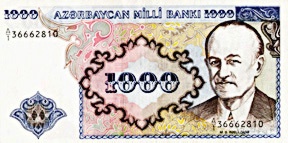|

Spring 1998 (6.1)
Pages 26-30
Democratic
Republic of Azerbaijan Leaders
(1918-1920)
Mammad Amin
Rasulzade - Statesman
(1884-1955)
by Fuad Akhundov
M. A. Rasulzade, famous Azerbaijani statesman, public figure
and one of the founding political leaders of the First Azerbaijan
Republic (1918-1920), was born on January 31, 1884, in Novkhane
(near Baku). He received his primary education at the Russian-Moslem
Secondary School and continued his studies at the Technical College
(now Petroleum College) in Baku. From 1903, beginning as a student
and continuing onward, Rasulzade began writing articles in various
opposition magazines.
1,000 manat bill featuring Mammad
Amin Rasulzade
During the First Russian Revolution
(1905-1907), Rasulzade got his political baptism by fire. At
that time, his anti-monarchist platform and his demands for the
national autonomy of Azerbaijan, aligned him with Social Democrats
and future communists. As the story goes, it was Rasulzade who
saved young Joseph Stalin in 1905 in Baku, when police were searching
for him as an active instigator of riots.
Even after the First Revolution, Rasulzade continued journalistic
activities. His first dramatic play entitled "The Light
in the Darkness," was staged in Baku in 1908. In 1909, he
left for Iran to participate in the rebellion of Sattarkhan,
the leader of the Azerbaijani liberation movement in Southern
Azerbaijan. While in Iran, Rasulzade became one of the founders
of "Iran-e No" (New Iran) Democratic Party. In 1911,
when Russian troops entered Iran, Rasulzade fled to Istanbul,
where his works were published in various journals. He returned
to Baku only after the Amnesty Act of 1923, dedicated to the
300th anniversary of the Romanovs Royal Dynasty.
One of Rasulzade's greatest achievements was the revival of ethnic
names, such as "Azeri" and "Azerbaijan."
When the Gulustan Agreement of 1813 and the Turkmanchay Treaty
of 1828 concluded between Russia and Persia, historic Azerbaijani
Khanates (Duchies) were divided between these two countries.
The ones annexed to Russia became known as Azerbaijan Soviet
Socialist Republic (from 1920 until 1991, when the USSR collapsed).
However, the larger land mass and greater population still remains
in Iran. Today, the estimated Azerbaijani population in Iran
is at least three times as large as the Azerbaijan Republic population
of 7.3 million.
After the annexation of the Russian Empire, Azerbaijani khanates
were replaced by the new subdivision of Guberniyas (provinces).
The name "Azerbaijan" remained in some Azerbaijani
provinces in Northern Iran, but for nearly a century, the Azerbaijani
population in the present-day Azerbaijan Republic was referred
to as "Moslem" or "Tatar," neither of which
was authentic. It was Rasulzade who pushed for the return of
the nation's historic name "Azerbaijani Turks" in 1914.
The Chairman of Musavat National Party since 1917, Rasulzade
was unanimously elected the Head of the Azerbaijani National
Council (Milli Shura) in May 1918, after the dissolution of the
Transcaucasian Federation.
On May 28 1918, the Azerbaijani National Council, headed by Rasulzade,
declared an independent Azerbaijan Republic. And even though
Rasulzade never held any governmental post in either of the Cabinets
of Ministers, as an active member of the Parliament he remained
a kind of ideological leader of the newly-formed state until
its collapse in May 1920. Rasulzade was also involved in the
establishment of the State University in Baku in 1919.
"The banner of liberty once hoisted will never be lowered
again." This famous phrase by Rasulzade would later become
one of the most popular Azerbaijani slogans during the demonstrations
of the 1990s, said on the eve of the collapse of the Soviet Union.
In August 1920, Rasulzade was arrested by the Soviets. It was
only due to his earlier support of Joseph Stalin that Rasulzade
was released and taken from Baku. For the next two years, Rasulzade
worked as the press representative at the Commissioner on Nations
in Moscow. He was seconded to Finland in 1922 and he never returned.
For the rest of his life, Rasulzade lived as an exile in Poland
(1938), Romania (1940) and finally, after WWII, in Ankara (Turkey)
in 1947. He died on March 6, 1955.
In the more than 30 years spent in exile, Rasulzade published
a number of serious political works dedicated to Azerbaijan.
His literary legacy still calls for sound analysis and thorough
evaluation.
From Azerbaijan International (6.1) Spring 1998.
© Azerbaijan International 1998. All rights reserved.
Back to Index
AI 6.1
(Spring 1998)
AI
Home |
Magazine
Choice
| Topics
| Store | Contact
us
|

